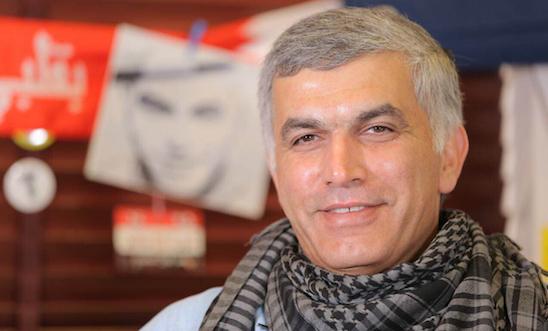Today, 8 November 2017, a Bahraini court pushed the final hearing for leading human rights defender Nabeel Rajab’s appeal trial to 22 November, refusing to hear the defense’s arguments and rejecting his petition for bail. Rajab, president of the Bahrain Center for Human Rights (BCHR), has been arbitrarily detained since 13 June 2016 on charges related solely to free expression. Today’s court decision is the latest development in his appeal against the 10 July 2017 ruling in which he was sentenced to a two-year prison term for media interviews about the kingdom’s restrictions on free press. The court refused to review the material submitted by Rajab’s defense team disputing the charge that Rajab had spread “false news” by, among other things, stating that the Government of Bahrain bans reporters from entering the country. The court is expected to issue a final decision for the appeal at the 22 November hearing.
In addition to the two-year sentence he received in this case, Rajab faces another 15 years in a separate trial for comments made on social media in which he criticized the war in Yemen and the systematic use torture in Bahrain’s prisons. The government has pushed his next hearing for this case to 19 November. Furthermore, the authorities have also threatened to prosecute Rajab over editorials that have been published in the New York Times and Le Monde, and another set of comments posted to his social media accounts while he was in detention.
Rajab has spent much of his detention in solitary confinement and unhygienic conditions that have led to a drastic deterioration of his health and repeated hospitalizations. On 26 October 2017, Americans for Democracy & Human Rights in Bahrain (ADHRB) received reports that Rajab had been transferred from Al-Qala’a, the Ministry of Interior (MOI) police clinic, to Jau Prison, the kingdom’s main long-term male detention center, where medical attention has been previously denied to prisoners of conscience. Rajab appears to be kept away from other political prisoners, and the guards have subjected him to degrading treatment, including forcibly shaving his hair, arbitrarily raiding his cell at night, and confiscating his personal items.
Rajab’s imprisonment has been met with condemnation from American officials, who have called on the Bahraini government to release Rajab since both his arrest and conviction. “The sentencing of Mr. Rajab demonstrates a serious step backwards, and undermines my confidence in the Bahraini government’s commitment to reform,” said Senator Ben Cardin (D-MD), Ranking Member of the Senate Foreign Relations Committee (SFRC). The Bahraini authorities have shown a “troubling lack of commitment…to the rule of law, due process, human rights, and protection of universal freedoms.” Senator Marco Rubio (R-FL), another member of the SFRC, called the July sentence “outrageous,” and the State Department indicated that the administration is “disappointed by the verdict” and reiterated its previous calls for Rajab’s release.
Nevertheless, the Trump Administration has largely increased support for the Bahraini government with the State Department approving in September 2017 a $3.8 billion arms sale that had been previously restricted – at least in part – by human rights conditions. The US Government also recently participated extensively in the Bahrain International Defence Exhibition and Conference (BIDEC), the kingdom’s first major defense expo, which was sponsored by American security companies like Lockheed Martin. Despite the government’s ongoing crackdown on civil society – and the fact that the conference was chaired by Bahrain’s Sheikh Nasser bin Hamad Al Khalifa, a prince accused of personally torturing protesters – the US delegation did not appear to raise any concerns about human rights or reform.
Nabeel Rajab is convicted solely for his human rights work, and the Government of Bahrain must immediately release and drop all charges against him and all other prisoners of conscience. Bahraini authorities should also allow Rajab to seek necessary medical attention and lift any bans that prevent him from travelling internationally. The US and the rest of international community must be unequivocal in their calls for these outcomes, and must push the Bahraini government to release all prisoners detained solely for exercising their basic human rights.





